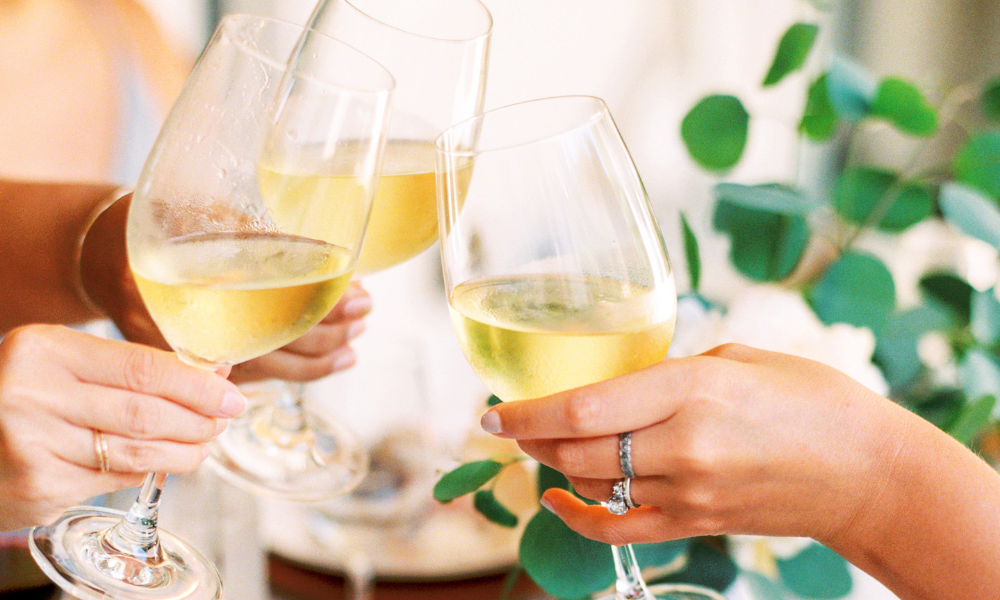4 Tips for Choosing Sustainable Wedding Wine
Wine is essential at almost any event! This means we can make a big impact by making smarter and greener choices when it comes to sourcing vino! Below are 4 steps for choosing more sustainable and earth-kind wine options for your next event.
Choose local wines, like those made in BC’s Okanagan Valley.
📍Go Local
While many assume that the best wines are from the most famous regions in France, Italy, and California, the truth is that grapes are grown, and beautiful wine is produced, all over the world! Unless your client has a very specific request to import wines, encourage them to have fun exploring local options that they love!
Here in BC we’re lucky to have over 200 wineries in the Okanagan alone, each with different styles and stories! Remind couples that carefully sourcing wines from a local vineyard isn’t only a great excuse for a romantic weekend of wine-tasting, it’s a lovely way to personalise their day, offering something different with a story to tell and the feel-good bonus of supporting local.
As well as where the winery is based, it’s also important to look for a winery that mostly uses local grapes and ingredients to further reduce carbon emissions related to shipping and other supply chain activities. Some wineries might also offer more sustainable shipping materials and have their own eco-friendly initiatives!
Make a toast with Organic white wine
🌱 Go Organic
Organic wines might be harder to come by, but organic wine production typically ensures that no synthetic fertilisers or pesticides are seeping into our earth! Instead, natural and composted materials are utilised to keep our planet healthier and happier.
Look for the B Corp Certification, which is a designation that a business is meeting high standards of verified performance, accountability, and transparency on factors from employee benefits and charitable giving to supply chain practices and input materials. To achieve certification, an organisation must demonstrate high social and environmental performance, make a legal commitment to be accountable to all stakeholders, and exhibit transparency about their efforts.
🥇Look Out for Sustainability Certifications
Certifications such as Sustainable Winegrowing BC (SWBC) and Biodynamic Association (now a part of Biodynamic Demeter Alliance) encompass the overall practices of a grower such as the conservation of water and energy in their operations, as well as overall carbon footprint through other efforts such as packaging.
Wineries that go above and beyond to meet the requirements of such Certifications will have worked hard to get their stamp of approval. It can be a useful way to help check if a brand is greenwashing or has put serious work in.
🏗Wineries that are LEED Certified
LEED (Leadership in Energy and Environmental Design) is a certification that reflects a building rating system. Their points-based program represents any LEED-certified building designed and created with sustainability efforts in mind and is the most widely used green building rating system in the world.
Couple wine tasting in a vineyard.
Looking for Greener Wineries in BC? Check these out…
🍷Summerhill Pyramid Winery, Kelowna
This family-run winery is Certified B Corporation and has been organically growing grapes since the 80s. In 2012 they received a Demeter Biodynamic certification. Driven by a “vision of gratitude and abundance for people and planet” they’re committed to taking care of the community and environment around them.
🍷Tantalus Vineyards, Kelowna
Not only does their estate draw attention for its beautiful architecture and views, but it also became BC’s first winery to earn the LEED certification. They are SWBC Certified and are recognized for initiatives that range from wastewater treatment to a naturally farmed vineyard and, in partnership with nearby Arlo’s Honey Farm, bee hives that keep orchards and vines buzzing with health.
🍷Stag’s Hollow, Okanagan Falls
This SWBC Certified winery is committed to sustainability across all departments, from the vineyards, to the winery and to their wine shop and offices. Clearly listed on their site is an impressive number of initiatives, like using geothermal heating systems and solar power, ensuring their vineyards are Salmon Safe, not using herbicides, eliminating single-use plastics, and much more!
🍷Nk’Mip Cellars, near Osoyoos
As the first Indigenous-owned winery in North America, their commitment to sustainability isn’t just about the land, but the people, and are inspired to express our culture in everything they do. Proceeds from the winery tasting fee go toward preserving the Okanagan language at the nearby Nk’Mip Desert Cultural Centre.
🍷Orofino, Similkameen Valley
At Canada’s first straw-bale winery, sustainability is built right into the walls. Powered by solar energy, the eco-friendly design uses straw to insulate the barrel room, keeping temperatures evenly cool with little energy use.
These are just a few of the many sustainability-focused wineries to explore! Have fun searching for your favourite new go-to wine and just remember that going local, organic, and seeking out wine that comes from growers with certifications such as SWBC, BD, and LEED will all contribute to a more sustainable future in the wine and event industries. 💚











